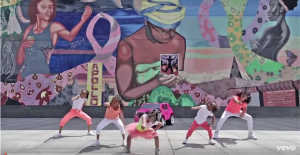Dear introverts: a letter from an extrovert
January 27, 2017
Strobe lights dart around the walls and arch up to the ceiling. Booming music with a rhythmic bass just short of earsplitting thuds incessantly. The floor below the speakers teems with people more tightly compacted per square foot than a can of sardines. Noise, crowds and the heavy-hanging odor of trampled-on ice cream and teenage sweat epitomizes most, if not all, school dances.
Theoretically, an introvert avoids social gatherings such as these at all costs — too many people in too small of a space for too long. If they go willingly, they easily tire from the experience and prefer to spend some time alone afterwards. An extrovert, on the other hand, not only enjoys the situation, but thrives in it. The extrovert is the friend who has boundless energy to attend the pre-party, the party and the after-party — and still start over the next day.
Extroverts are sociable and tend to gravitate towards the center of attention within a crowd, while introverts prefer getting together with a few close friends and generally keeping to themselves. People typically identify as one or the other, and the opposite traits of each tend to perpetuate a misunderstanding between the two.
Inspired by News Editor Elisa Fang’s letter about her perspective as an introvert in the December issue, I decided to give my two cents about being an extrovert. Society generally favors the extroverted individual over the introverted — being sociable and well-connected is good news for the workplace. However, the eagerness of extroversion can come off as constantly seeking the attention and approval of others.
Sometimes, it’s true. While an introvert breathes a sigh of relief when they don’t have to go to a party, an extrovert might feel a punch to their insecurities of not being accepted when they’re not invited. Being sociable may occur more naturally in the personality of an extrovert, but the effort to maintain a conversation with another person can be just as taxing. What’s more, if I simply want to be alone for a few moments, people think something awful has happened.
I envy the introvert’s ability to understand oneself introspectively. When I am so engaged with being with other people or primping myself up to look fancy for a social gathering, I lose sight of who I am as a person, and become concerned with how others see me. After all, if you are expending most of your energy outwards, there is little left to salvage for looking inwards.
The introverted individual prefers to stick to what they are comfortable with — being alone or with one or two close friends, doing something calming. As an extrovert, I find myself in a large group, but amongst them few who I can truly confide in, and typically doing something exciting but physically exhausting, like going to a party or touring the city. While I willingly put myself in such a situation and I always enjoy myself, sometimes the peace and quiet that appeals to an introvert seems pretty appealing to me, too.
Again, this isn’t to say that there are only two camps — personality is more of a spectrum rather than of extremes. This is simply to note that while the extroverted 75 percent of the American population (Psychology Today) may not fully understand the introverted minority’s tendencies to go off alone or remain quiet in conversations, we are trying. We are trying to understand that we may come off too strong, our boundless energy to socialize can be annoying and we seem to open our innermost feelings to strangers. We are trying to understand that our unconscious urge to push ourselves to the center of attention can appear, well, self-centered. But most of all, we are trying to understand that despite the differences between our personalities and those of the introverted, we are all the same in our dreams, ambitions and insecurities.


